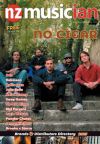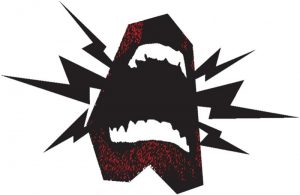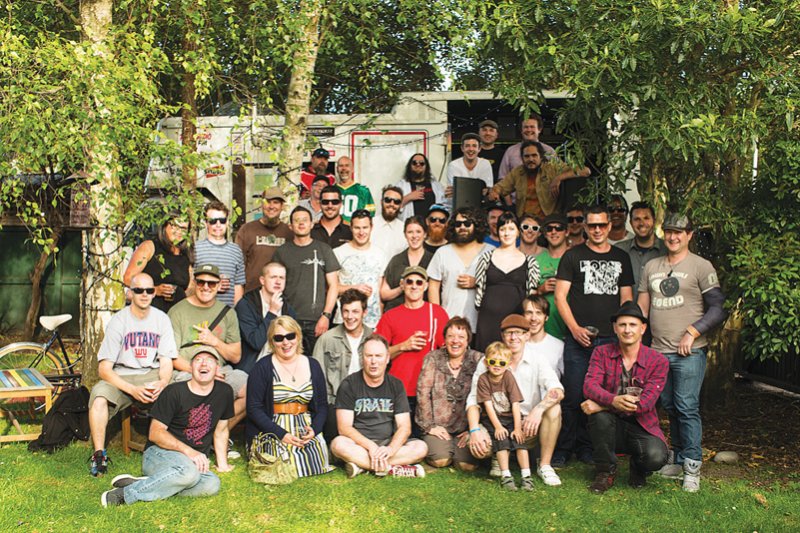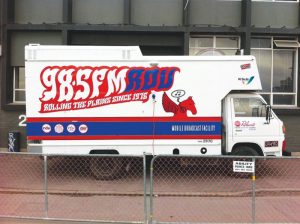Industry: Student Radio (Part 1)
Industry: Student Radio (Part 1)
New Zealand, and the Auckland region in particular, is renowned for being over-supplied with radio stations. It’s also known for having some highly reputable student-focused radio broadcasters – whose reach, in the internet era, has become global. Auckland’s bFM, by way of example, is the only station outside of the States that is part of the College Music Journal (CMJ) student radio chart network, in terms of supplying that important taste-making organisation with airplay data for its weekly charts.
Being, naturally enough, the biggest of the local student stations led to bFM assuming a senior role among the stations, to the degree that as a group they have for many years been known collectively as the bNets. Despite being quite independently owned and managed, the student radio stations in Dunedin (Radio One), Christchurch (RDU), Wellington (Radio Active), Palmerston North (Radio Control), Hamilton (Contact FM) and Auckland (bFM), some campus-based, some not, have conveniently been grouped as the bNet stations.
The collective tag was anomalous and not surprisingly had over time come to rankle with some. At a meeting of the various station managers in late 2009 it was proposed and agreed to change the name of the network (back) to the old-school ‘Student Radio Network’.
The meeting’s chairman James Meharry (managing director of RDU) describes it as “… returning to our roots and saying what we are.”
He admits that it has been hard to make an independent network structure function properly, regardless of the name.
“We have lots of similarities but we are also all fiercely independent. We do all share relationships with student broadcasting that forms part of our licensing with the Ministry for Culture and Heritage.
“It’s well known, quite a cliché really, that the student radio network stations provide the biggest range of musicians with their first opportunities on air. We don’t have the high rotate that you get on commercial radio, but we do provide a starting platform for new and unreleased acts.”
Unfortunately the ‘bNet’ moniker has proved a convenience and entrenched habit that most everybody has found hard to quit. A rebranding process was planned, but since the Christchurch earthquakes Meharry has been distracted, and there has been very little activity within the Student Radio Network group – actually none.
But there have been some major environmental changes, the Voluntary Student Membership Bill for one. Otago USA’s plans to sell off Radio One and the loss of Hamilton’s frequency to community radio in 2011. NZ On Air’s 18 month-old Making Tracks scheme adopted a pro-alternative music stance that has required student radio involvement. New artist-breaking website theaudience.co.nz, itself NZ On Air-funded, has also actively engaged with the stations. And then there’s the global economy…
With a new student intake arriving to become the listenership for these important taste-making music outlets, NZ Musician thought it was time to have a look at each of the remaining student-oriented radio stations and ask some questions like: Who owns them? Who runs them? Who listens to them? Who funds them?
Unfortunately due coverage to these important harbingers of new local and international music talent simply couldn’t be squeezed into one issue – we’re not a student paper after all. The following then is Part One of a two-part article, in which the managers of each station have been asked a similar set of questions.
We’ve started with RDU because of all the Student Radio Network stations it is the Christchurch broadcaster which has been most challenged by circumstances in the last few years. NZM’s April/May issue will include Radio One, Radio Active, Radio Control and bFM.
RDU – University of Canterbury, Christchurch
It should be no surprise that the last few years have been bloody tough for all the student-oriented radio stations around the country – but Christchurch’s RDU (98.5FM) most certainly got the short straw. The city’s second big quake in February 2011 smashed up much of the University of Canterbury and the on-campus radio studio fared so badly that they were forced to completely vacate the building.
Not only was the station left homeless but the local economy on which it relied was also a write-off. Station director James Meharry isn’t joking when he says that the station’s only remaining ad income came from an AP that had been forgotten about.
“All the rents were immediately jacked up to four times what we had been paying and it was impossible for us to go into any other place post-quake. So we went about finding something different, another strategy, and hence the concept of the RDUnit [a transformed horse truck] came up.”
Well known about the traps from his music label/events company Fabel, Meharry first got involved with RDU in 1993 as a co-host on a friend’s show. He subsequently organised events, had his own show, and in 2002 was offered a sales role – at which he excelled. He and his partner Karyn now own RDU98.5FM Ltd, the company that holds the rights to manage the station’s broadcast license (ultimately controlled by the Ministry for Culture & Heritage), in partnership with the University of Canterbury Students Association.
“We essentially have a contract with the UCSA to manage the license and obviously we have to run it like a business. The license from the Ministry actually requires that there be no profit made, and we are exploring the potential to change to another model with a charitable status perhaps. At the moment it’s remaining a limited liability company.”
They took over management of RDU in February 2006. Meharry says the station had historically lost money nearly every year since it was started in 1976. UCSA were conscious of their responsibilities to students but looking to minimise their fiscal risk.
“In terms of station viability sales are the game. If you’ve got good sales and a good way of managing the sales relationships then you can focus on being a great broadcaster as well. Under the UCSA it was harder than it needed to be. There was a lot of ‘triplicate’ style management, and it was difficult, in some cases hazardous to the sponsorship relationships that I was trying to build. I felt that if I could protect those relationships then the station had every chance of growing, instead of folding.
“Which is what happened. It keeps its nose above water, but if it does lose money it hasn’t been a lot, and only because of external forces out of our control.”
Christchurch’s second big quake literally shut RDU down. The business was forcibly downsized, rubbed out and subsequently redrawn, from scratch. With the appointment this year of Rachel Morton as station manager his role is now essentially that of managing director.
Morton has quickly worked her way up from breakfast producer to sales and now management. There are about 120 the RDU team including hosts and their sidekicks, with three other paid positions. Audio engineer (Nik Coulter) also manages schedules. The Programme Manager (Gabriel Calcott) is also the music director and recording and produces the weekly NZ On Air-sponsored ‘Making Tracks Exposed’ feature.
Breakfast host Zac Cooper also manages the station’s loyalty card scheme ($30 non-student/$10 for students), re-launched in November and called RDUnited.
“The toughest part of the budget in running a radio station is staffing,” Meharry says. “Being a volunteer organisation you can rely on a lot of support, which is fantastic, but there is also a pragmatic amount of work that needs to be done. I think that student radio as a whole, across NZ, we aspire to do a lot more than what happens in the cookie cutter commercial environment. Keeping the programming diverse requires a lot of work and the only way for me to operate was to get people into the business who were straight up hard grafters.”
In the last year and a half they have produced two 12-part radio documentaries, both of which have aired on Radio NZ National. ‘A Flat City’ is about the creative voices of Christchurch; musicians, venues, engineers. The second, called ‘Music Is Sport’ looks at what it involves to be a musician in a band, drawing from the station’s annual band competition, RounDUp.
RounDUp started in ’98 and is nowadays held annually at Dux Live. A DJ/electronic performers competition, called Decknology, is likewise staged annually.
As the 2013 student intake start arriving in the broken city, Meharry remains unsure about just when RDU will be able to move into a more permanent and stationary studio, but he has renewed confidence about its survival. The station now has a second studio on campus, in partnership with the university’s journalism department. Media Studies interns broadcast a student-focused show three times a week and are trained up within RDU, gaining points towards their degree.
“The way we broadcast now enables us to switch to that new studio for that show. It’s been tough not being on campus, but we understand that it’s just very difficult for everyone at the University of Canterbury at the moment, they’re challenged with low numbers and a lot of damage. We’ve worked hard to maintain a relationship with the students. It’s fundamental to our license and RDU’s ethos to have a relationship with the student body.”
Adapting a horse float to be the studio was a stroke of genius, but Meharry admits to having had a lot of dramas with it.
“It was both inspiring and very, very challenging to make it broadcast ready, not just VOIP. Everything is going out over an audio codex and getting that to work in a professional way was very challenging. The signal starts as analogue gets processed and compressed by codec on the truck, down to 90kbits, which fits down a phone line. It is (fingers crossed) stable at the moment and it has actually given us more options as far as broadcasting is concerned.”
RDU’s broadcast power is 500W. The transmitter was moved from Huntsbury Hill late last year and is now on Marleys Hill, near Sugarloaf. Meharry says it gives them better reach and also the chance to broadcast over the hill to the harbour, including Lyttleton where he lives. He’s reluctant to guess at listenership numbers, but says students consistently make up about a third of RDU’s audience.
“I’ve tried to not focus on that style of promoting radio. We deal in the environmental and cultural perspective and so we talk about what we do and what we provide as a regionless broadcaster, as opposed to how many people listen.
“It’s naturally a wide audience, which is what makes it great I think. I regularly get feedback that we play the widest gamut of music. We have 22 specialist shows – some of them have been with the station for over 25 years. The PD’s brief is to choose the best of the widest range of music possible. Difference and diversity is the mandate we have been provided by one of our key stakeholders, NZ On Air, and we feel we fulfil that brief perfectly.
NZ Music content runs between 30 and 40%. The most popular show is The Joint, a longstanding (10 years or so) and eclectic show run by Fraserhead and the Herb Whisperer which runs on Saturdays, midday until 2pm.
Meharry says NZ On Air sponsor five or six components that they propose annually, the station’s NZ On Air grants typically representing about a third of the overall annual revenue. “It’s crucial to our existence but we by no means rest on it, the other two-thirds is something we work very hard to maintain.
The broadcast funding agency’s website reveals that funding designated for RDU has typically been around $100,000 annually. In 2012 it was upped to $165,600, with $45,600 allocated to production of the RounDUp radio series and $20,000 for the station’s Making Tracks’ show Exposed.
“It’s very heartening to come back after being levelled and be in a better position than you were beforehand. NZ On Air have shown us a lot of respect and support. We really couldn’t have made it through the earthquake scenario without that support. We had to work for it but they provided an opportunity and I think the station now has a positive future.




